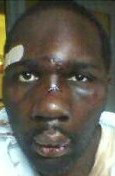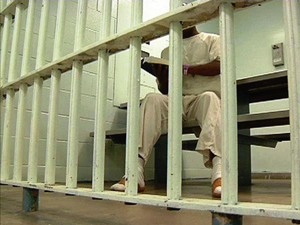Locked down, exploited and mistreated
By Charlene Muhammad and Starla Muhammad -Staff Writers- | Last updated: Jan 4, 2011 - 12:31:55 PMWhat's your opinion on this article?
Concern rises about inmates allegedly beaten by guards in Georgia strike and mistreatment of prisoners detained in institutions across the country
 Miguel Jackson was beaten by guards, according to his family members. |
Days later he was brutally beaten by guards at Macon State Prison, his family and a coalition of supporters charge.
When his mother Willie Maude Dean and members of the Concerned Coalition to Respect Prisoners' Rights attempted to visit him at the Atlanta Medical Center on Dec. 31, the hospital claimed her son was no longer there and the corrections department claimed he was moved to Jackson State Prison the night before, according to an alert The Final Call received from Coalition co-chair Elaine Brown.
Ms. Brown said the Coalition found out about the beating during its second fact-finding visit to Smith State Prison on Dec. 30. Its first prison visit was to Macon on Dec. 20.The Coalition asserts the beating was in retaliation for the protest, which began in early December.
In addition, Ms. Dean said the Georgia Department of Corrections has given no information about her son's condition or his whereabouts.
 Another inmate allegedly beaten by guards at Smith State prison in Georgia. |
The family of a second inmate, Miguel Jackson alleges he was severely beaten by upwards of 20 guards Dec. 31 during what is called a “shakedown” at Smith State Prison near Glennville, Ga. in which corrections officers search prisoners' cells. Upon finding nothing, said Mrs. Delma Jackson, Miguel's wife, the officers accused Mr. Jackson of having “something.” Mr. Jackson was pepper sprayed, handcuffed and beaten repeatedly with hammers resulting in a fractured nose and 50 stitches to his face, said Mrs. Jackson. Guards also attempted to throw him over the railing from the second floor, she said.
And because the family has not been allowed to see him, his wife said they worry whether or not he may have a concussion or internal injuries. Upon seeing pictures of her husband, Mrs. Jackson said she and other family members drove New Year's Day, three and a half hours from Atlanta, to check on his status. Their visit was denied by corrections personnel, she said. This was after the family waited 90 minutes to be given a sheet to fill out, requesting a visit. “We didn't even want to sit there and visit, we just wanted to see that he was okay and they denied us that right,” Mrs. Jackson told The Final Call.
 Prison labor is a multi-billion dollar business, but activists fear few resources are being allocated to educate and reform inmates for life after prison. Photo: MGN Online |
The prisoners' strike included Hays, Smith, Telfair, Macon State Prisons, and other facilities. Inside the institutions, inmates refused to come out of their cells to petition officials to be paid for work given that they must pay for medical services, better medical care and better quality food, more self-improvement and educational programs, consistent disciplinary policies and a clear parole policy.
Coalition spokespersons said that beating occurred around the same time it was negotiating access to certain prisons to investigate conditions, and even as the delegation visited Macon State, the corrections department was apparently covering up the inmate's reported retaliatory beating by several CERT (Correctional Emergency Response Team) members.
Witnesses reported to the Coalition that CERT officers restrained Terrance Dean after an alleged dispute with a guard, dragged him from his cell in handcuffs and leg irons, removed him to the prison gym and beat him unconscious.
The beating remained unreported by corrections officials even though the Coalition specifically raised questions about reports of retaliatory beatings, said the group. Questions were also asked about the status and whereabouts of 37—or more—men the corrections department identified as strike “conspirators,” the Coalition said.
The Coalition formed to help support the prisoners' calls for reform and includes the NAACP, the Nation of Islam, the ACLU of Georgia, the U.S. Human Rights Network, All of Us or None, and The Ordinary People Society. Among other concerns is the potential cover up of an attempted murder.
“This agenda just got jumped up 10,000 times, not by us, but by them, these men who are suffering inside these walls.They're the spark that lit the prairie fire and hopefully we who are on the outside that have united around their particular interests in Georgia can keep this going.The coalition has attracted a lot of people but the interesting thing is where in the hell is John Lewis? The coalition is growing but absent in any kind of way is the Congressional Black Caucus,” Ms. Brown said, referring to Congressman John Lewis (D-Ga.) and other federal lawmakers.
She told The Final Call that few political officials from Georgia have addressed the issue. But State lawmaker Roberta Abdul Salaam has been very supportive, said Coalition leaders. The Coalition has reached out to CBC Chair Rep. Barbara Lee (D-Calif.) and Rep. Lewis but have not received a response, said Ms. Brown.
“Everybody else in the world has come in without us sending a message to them, but not them.Where is the CBC?These men are their constituents, especially John Lewis, Tyrone Brooks (a state representative), and other Black leaders in Georgia?” asked Ms. Brown.
“We need them to do something; bring the federal government in on behalf of these men ... . This is a disgrace that these people came into office on the blood of our people like Fannie Lou Hamer who gave up her eye and her life ... The duty of Black elected officials here is clear and they have failed to do their duty to these men and address this question. And I'm saying they should come on back home before we have to start talking about what we're doing about their failure,” Ms. Brown said. Ed DuBose, head of the Georgia state NAACP, is co-chair of the Coalition.
Coalition: Inmates complained of retaliation after peaceful strike
“They (inmates) got shipped out of their home institutions and were dispersed across the state.We think that they were primarily dispersed into two facilities but we have not had access to them yet,” said Ajamu Baraka, director of the U.S. Human Rights Network, and a member of the delegation that visited Smith State Prison.
He said, “among information received was that prisons only fed the inmates bologna sandwiches for six days—all to break the back of the strike. And then they released everybody and announced to the world that everything was fine. But the information we got was that the inmates understand that they struck a blow for their rights (and) that they may have to strike again to make sure that people understand how serious this situation really is,” Mr. Baraka told The Final Call.
After the visit, he said, the Coalition's concerns over conditions grew, particularly since Macon was supposed to be a model facility.For example, he said, “the hole” or isolation units, consist of 7 x 12 size cells and inmates are double bunked in them 24 hours a day, seven days a week. Although inmates are supposed to get an hour out for recreation, the delegation learned that they hardly ever do for months at a time, Mr. Baraka added.
Mr. Baraka said he feels one reason prison authorities moved to shut down the strike quickly was because it could serve as a possible model for prisoners across the country.
But the outcome of the action in Georgia will determine whether there will be more and similar uprisings across the U.S., he predicted.
“The conditions in these prisons across the country are such that it's amazing that we haven't had more explosive situations or strikes because you have overcrowding, brutality, neglect, and the inability of prisoners to address these issues because of the Prison Reform Litigation Act passed by the Clinton administration, which has made it difficult for you to go to court to try to get the judiciary to intervene to deal with these inhumane conditions,” Mr. Baraka continued.
According to legal analysts, former President Bill Clinton passed the Prison Reform Litigation Act in 1996 to combat frivolous lawsuits brought by prisoners, in an effort to unclog an already back-logged U.S. judicial system.
But Human Rights Watch said the federal law should be amended because it denies prisoners equal access to justice by singling out their lawsuits for burdens and restrictions that apply to no one else.
Racially biased policies
and the prison economy
All of these issues are part of the larger problem with having a prison economy, said Attorney Michelle Alexander, a civil rights advocate and author of “The New Jim Crow: Mass Incarceration in the Age of Colorblindness.”
She told The Final Call she doesn't believe profitwas the primary motive for the drug war and mass incarceration at the outset.
Nonetheless, the numbers are daunting.In 2007, nearly 2.3 million people were locked up in U.S. prisons, the highest incarceration rate in the world. Nearly one million Black men and women are incarcerated, 41 percent of total inmates.
According to criminal justice statistics by the NAACP, Blacks are incarcerated at nearly six times the rate of Whites; one in six Black men had been incarcerated as of 2001; and one in 100 Black women are currently in prison. The U.S. is five percent of the world population yet has 25 percent of the world's prisoners, according to an NAACP fact sheet.
This mass incarceration comes out of racial politics stirred up by the Republican Party, Atty. Alexander argued. Essentially, she said, the GOP exploited the fears and anxieties of poor, working class Whites by launching a movement, promising to “get tough” on “those people” and built a campaign around crime and welfare to mobilize poor and working classWhite voters to defect from the Democratic Party and join the Republican Party in droves.
“But now that the war on drugs and mass incarceration has gained such steam, there's a whole range of interests that has found that they can profit from caging human beings and it's not just the private prison companies listed on the New York Stock Exchange but it's a whole range of corporate interests,” she said.
“You know, taser gun manufacturers, phone companies that gouge prisoners and their families, the private health care providers that provide typically abysmal health care to prisoners, and prison guard unions,” all of whom now lobby for harsh criminal justice policies to try to ensure their profits and jobs will continue for a foreseeable future, Atty. Alexander said.
Back in the day, prisons used to have their stock prices posted in the front of the facilities, because guards had employee stock options, according to Alex Friedmann, associate editor of Prison Legal News and president of the Private Corrections Institute, a non-profit advocacy group that opposes the privatization of prisons.He spoke of his past experience of 10 years of incarceration.
“When the guards came into work, they could see how well the company was doing ... so they had a vested interest to make sure that the company did well, so that meant cutting back on costs, so if you had to screw prisoners out of something or remove something from them to save money and increase your bottom line, that's what you would do. ... It went along the lines of a for-profit industry, you know, ‘These are little money signs, just $45 a day per diem that we make for keeping them in prison, so it's not really a person, just a number with a dollar sign in front of it,' ” Mr. Friedmann said.
But soon employee morale suffered when the stock spiraled downward and people came to work only to find out that their entire savings had been wiped out, he said.
Mr. Friedmann echoed Atty. Alexander's sentiments that the correctional system exploded in the 1980s and after the military industrial complex went downhill, the prison industrial complex arose. Security resources, law enforcement, and military got funneled into the war on drugs and crime rose, but it's really a war on Americans, citizens accused of crime and recreational drug use, he asserted.
“Our justice system is not only racially skewed but moreso it's class-based.Prison Legal News approaches it from the standpoint that the criminal justice system is primarily management for poor America. ... You don't see a lot of rich people because we have a two-tiered justice system: The poor go to prison and the rich tend to get drug treatment or probation or home confinement or GPS monitoring or something else,” Mr. Friedmann said.
The problem, say civil and human rights activists, amounts to a systematic pattern of over-incarceration that needs to be addressed particularly since more than half of the millions of people in U.S. prisons are non-violent offenders. Chara Fisher Jackson, legal director of the ACLU of Georgia, says the issues of prison overcrowding, lack of access to health care, inhumane treatment and other abuses are happening nationwide, but people have a right to basic human rights regardless of their circumstances.
Alternatives to expensive incarceration
Inmate advocates argue that the nearly $70 billion being spent nationally on corrections each year could be better used on non-vengeful alternatives, like drug treatment and programs that are mental-health focused.But instead of a rehabilitative approach, the country takes a retributive one that requires not an eye for an eye, but an eye and 20 years to life, Mr. Friedmann said.
He cited home monitoring, work service, day fines, split confinement, like weekends in jail or work days and evenings in jail as a few alternative solutions.
The main thing that people need to see is that prisoners are human beings and 95 percent of them will be re-entering their communities, he said.
The options are people who have been abused, degraded, humiliated, and treated like slaves or people that have been helped, rehabilitated, and serviced through programs, the prison reform advocate continued.
“I think that would be a simple solution, but not for our country,” he said.
Nathaniel Ali, executive director of the inmate and ex-offender education and resource advocacy group National Association of Brothers and Sisters In & Out of Prison, asserted that problems highlighted by the Georgia inmates exist in institutions nationwide
These conditions are a continuation of policies tied to economics and “slaveocracy”—prisons profiting off the backs of inmates and their families.
There is a real connection to maintaining poverty through the prison industrial complex, said Mr. Ali. Excessive charges by phone companies for telephone calls as just one example, he added.
Phone calls, price gouging and family suffering
Activists added though prisons scoff at and punish prisoners for using cell phones, the system generated the need for phones because of price gouging for calls and denying inmates access to their families.
“The excessive charges for telephone calls has been an issue for years but now companies are beginning to diversify because there is money to be made,” but not just by MCI, Mr. Ali said.
“What is happening is larger companies are subcontracting with smaller companies who are in turn, also billing telephone calls. So in essence, inmates and their families are being double billed for one phone call. If the first minute is $3 and something then it's going to end up being $6 and something ... . Companies are cashing in with the digital technology with what they know is going to be profitable,which is the inmates wanting to hear somebody's voice on the other end of the line,” he said.
“The Honorable Minister Louis Farrakhan said, ‘Justice is a human need, therefore justice is a human right,' ” said Nation of Islam Student Prison Reform Minister Abdullah Muhammad.
He said the needs and rights of families are critical. “The high prices for phone calls cause some family members to block calls from jails and prisons, which can negatively affect family relations and anything that disrupts family or is against the general welfare of the family is therefore against the aim and purpose of God and creation,” Min. Muhammad said.
According to Prisoners.com, a Pennsylvania-based nonprofit organization: An inmate may open an account with the telephone company and give them money in advance. However, in that instance the prisoner pays about $6.16 for a 15 minute conversation. Comparable service for persons not in prison costs about 75 cents.
“Somebody's getting rich on the backs of prisoners and their families,” notes the site.
Prisoners.com goes on to note that for collect telephone calls, the inmate's family must pay about $7 for a 15 minute conversation. If the phone call is disconnected before the allotted time, reconnection fees may apply.
For inmates, who in some cases make as little as $20 to $30 per month, a 30 minute telephone call to a loved one may cost half-a-month's wages.
Related news:
Prisoners' strike becoming movement for justice (FCN, 102-30-2010)
'Lockdown for liberty!' exposes prison conditions (FCN, 12-14-2010)
No comments:
Post a Comment